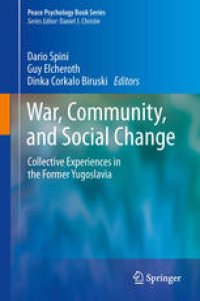
Ebook: War, Community, and Social Change: Collective Experiences in the Former Yugoslavia
- Tags: Cross Cultural Psychology, International Relations, Migration
- Series: Peace Psychology Book Series 17
- Year: 2014
- Publisher: Springer-Verlag New York
- Edition: 1
- Language: English
- pdf
Collective experiences in the former Yugoslavia documents and analyses how social representations and practices are shaped by collective violence in a context of ethnic discourse. What are the effects of violence and what are the effects of collectively experienced victimisation on societal norms, attitudes and collective beliefs? This volume stresses that mass violence has a de- and re-structuring role for manifold psychosocial processes. A combined psychosocial approach draws attention to how most people in the former Yugoslavia had to endure and cope with war and dramatic societal changes and how they resisted and overcame ethnic rivalry, violence and segregation. It is a departure from the mindset that depict most people in the former Yugoslavia as either blind followers of ethnic war entrepreneurs or as intrinsically motivated for violence by deep-rooted intra-ethnic loyalties and inter-ethnic animosities.
War, Community, and Social Change documents and analyses how social representations and practices are shaped by collective violence in a context of ethnic discourse. What are the effects of political violence, and what are the effects of collectively experienced victimization on societal norms, attitudes, and collective beliefs? This volume stresses that mass violence has a de- and re-structuring role for manifold psychosocial processes. The interdisciplinary approach draws attention to how most people in the former Yugoslavia had to endure and cope with war and dramatic societal changes, but also how they faced and resisted ethnic rivalry, violence, and segregation. It is a departure from the belief that depicts most people in the former Yugoslavia as either blind followers of ethnic war entrepreneurs or as extremists intrinsically motivated for violence by deep-rooted intra-ethnic loyalties and inter-ethnic animosities.
War, Community, and Social Change documents and analyses how social representations and practices are shaped by collective violence in a context of ethnic discourse. What are the effects of political violence, and what are the effects of collectively experienced victimization on societal norms, attitudes, and collective beliefs? This volume stresses that mass violence has a de- and re-structuring role for manifold psychosocial processes. The interdisciplinary approach draws attention to how most people in the former Yugoslavia had to endure and cope with war and dramatic societal changes, but also how they faced and resisted ethnic rivalry, violence, and segregation. It is a departure from the belief that depicts most people in the former Yugoslavia as either blind followers of ethnic war entrepreneurs or as extremists intrinsically motivated for violence by deep-rooted intra-ethnic loyalties and inter-ethnic animosities.
Content:
Front Matter....Pages i-xii
Front Matter....Pages 1-1
Towards a Community Approach of the Aftermath of War in the Former Yugoslavia: Collective Experiences, Social Practices, and Representations....Pages 3-23
Collective Experiences and Collective Memories: Writing the History of Crisis, Wars, and the “Balkanisation of Yugoslavia”....Pages 25-41
Front Matter....Pages 43-43
Ethnic Intolerance as a Product Rather than a Cause of War: Revisiting the State of the Art....Pages 45-62
The Demise of Mixed Marriage?....Pages 63-84
The Destruction of Multiethnic Locations: Markers of Identity and the Determinants of Residential Trajectories....Pages 85-98
Compliance and Resistance to the Logic of Ethnic Conflict During the Siege of Sarajevo (Invited voice)....Pages 99-103
Beyond Ethnic Intolerance: Traces and Benefits of Ethnic Diversity in Post-War Bosnia-Herzegovina....Pages 105-121
Front Matter....Pages 123-123
From Collective Victimhood to Social Reconciliation: Outlining a Conceptual Framework....Pages 125-136
Traumatised Selves: Does War Trauma Facilitate In-Group Bonding and Out-Group Distancing?....Pages 137-153
When Nobody Stood Up and Everybody is Guilty: A Puzzle of Individual Responsibility and Collective Guilt (Invited voice)....Pages 155-161
Threatened Powers: When Blaming “the others” Grows out of Internal Instability and Protest....Pages 163-182
Shattered Beliefs: How to Cope When the World Is not a Just Place?....Pages 183-198
A Slipping Memory: Can the International Criminal Tribunal be a Bulwark Against Oblivion?(Invited voice)....Pages 199-204
Beyond Collective Denial: Public Reactions to Human Rights Violations and the Struggle over the Moral Continuity of Communities....Pages 205-226
Conclusion-War and Community: What Have We Learned About Their Relationship?....Pages 227-235
Back Matter....Pages 237-241